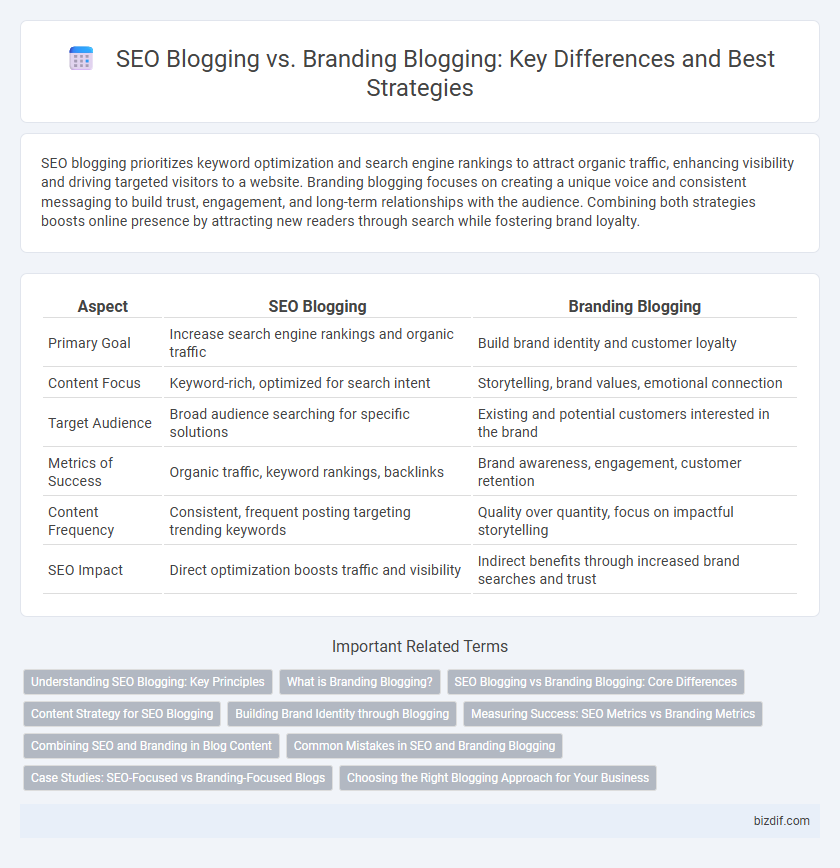SEO blogging prioritizes keyword optimization and search engine rankings to attract organic traffic, enhancing visibility and driving targeted visitors to a website. Branding blogging focuses on creating a unique voice and consistent messaging to build trust, engagement, and long-term relationships with the audience. Combining both strategies boosts online presence by attracting new readers through search while fostering brand loyalty.
Table of Comparison
| Aspect | SEO Blogging | Branding Blogging |
|---|---|---|
| Primary Goal | Increase search engine rankings and organic traffic | Build brand identity and customer loyalty |
| Content Focus | Keyword-rich, optimized for search intent | Storytelling, brand values, emotional connection |
| Target Audience | Broad audience searching for specific solutions | Existing and potential customers interested in the brand |
| Metrics of Success | Organic traffic, keyword rankings, backlinks | Brand awareness, engagement, customer retention |
| Content Frequency | Consistent, frequent posting targeting trending keywords | Quality over quantity, focus on impactful storytelling |
| SEO Impact | Direct optimization boosts traffic and visibility | Indirect benefits through increased brand searches and trust |
Understanding SEO Blogging: Key Principles
SEO blogging emphasizes keyword research, on-page optimization, and backlink building to enhance search engine rankings and drive organic traffic. It involves creating content that targets specific search queries while maintaining relevance and readability to satisfy both users and algorithms. Consistent analysis of performance metrics and adaptation to evolving SEO trends ensures sustained visibility and engagement.
What is Branding Blogging?
Branding blogging focuses on crafting content that strengthens a company's identity and builds long-term relationships with its audience through consistent messaging and storytelling. Unlike SEO blogging, which targets keyword rankings and immediate traffic, branding blogging aims to foster trust, recognition, and emotional connection by showcasing values, mission, and unique voice. This approach enhances brand loyalty and positions the business as an authority within its industry.
SEO Blogging vs Branding Blogging: Core Differences
SEO blogging centers on optimizing content with targeted keywords, meta descriptions, and backlinks to improve search engine rankings and drive organic traffic. Branding blogging emphasizes storytelling, consistent brand voice, and emotional connection to build brand identity and customer loyalty. The core difference lies in SEO blogging's focus on search visibility and traffic growth, whereas branding blogging prioritizes long-term brand recognition and audience engagement.
Content Strategy for SEO Blogging
SEO blogging centers on creating keyword-rich, search-engine-optimized content designed to improve website rankings and attract organic traffic. The content strategy involves thorough keyword research, regular posting of valuable and relevant articles, and optimizing on-page elements like meta tags, headings, and internal links to enhance visibility and user engagement. Prioritizing data-driven insights and trending topics ensures the blog consistently aligns with search intent and algorithm updates, boosting overall SEO performance.
Building Brand Identity through Blogging
SEO blogging targets search engine algorithms by incorporating high-ranking keywords and optimizing content structure to increase website visibility and organic traffic. Branding blogging emphasizes storytelling and consistent voice to create emotional connections, build trust, and establish a memorable brand identity that resonates with the target audience. Combining strategic SEO elements with authentic brand messaging enhances brand recognition while driving sustainable website growth.
Measuring Success: SEO Metrics vs Branding Metrics
SEO blogging success is primarily measured by metrics such as organic traffic, keyword rankings, click-through rates, and bounce rates, which directly reflect search engine visibility and content relevance. Branding blogging, however, focuses on metrics like brand awareness, audience engagement, social shares, and sentiment analysis to gauge emotional connection and long-term loyalty. Combining both SEO metrics and branding metrics offers a comprehensive evaluation of a blog's overall impact on growth and reputation.
Combining SEO and Branding in Blog Content
Combining SEO and branding in blog content enhances visibility and builds a loyal audience by incorporating targeted keywords with a consistent brand voice. Effective SEO blogging drives organic traffic through search engine optimization techniques, while branding blogging fosters emotional connections and strengthens brand identity. Integrating both approaches optimizes search rankings and cultivates trust, creating a balanced strategy that maximizes long-term engagement and business growth.
Common Mistakes in SEO and Branding Blogging
Common mistakes in SEO blogging include keyword stuffing, neglecting quality content, and ignoring user intent, which can reduce search engine rankings and reader engagement. In branding blogging, errors often involve inconsistent brand voice, lack of authentic storytelling, and failing to connect emotionally with the audience, weakening brand loyalty. Both types of blogging require strategic balance between optimization and genuine value to effectively support digital marketing goals.
Case Studies: SEO-Focused vs Branding-Focused Blogs
Case studies reveal that SEO-focused blogs prioritize keyword optimization, backlink strategies, and content structure to drive organic traffic and improve search engine rankings. Branding-focused blogs emphasize storytelling, consistent voice, and emotional connection to build brand loyalty and recognition over time. Data shows SEO blogs generate higher short-term traffic spikes, while branding blogs foster sustained audience engagement and long-term value.
Choosing the Right Blogging Approach for Your Business
SEO blogging focuses on targeting specific keywords to drive organic traffic and improve search engine rankings, making it ideal for businesses aiming to increase visibility and leads quickly. Branding blogging emphasizes storytelling and consistent brand voice to build trust, engagement, and long-term customer loyalty. Selecting the right approach depends on business goals, with SEO blogging suited for growth via search and branding blogging best for establishing a strong market identity.
SEO Blogging vs Branding Blogging Infographic

 bizdif.com
bizdif.com